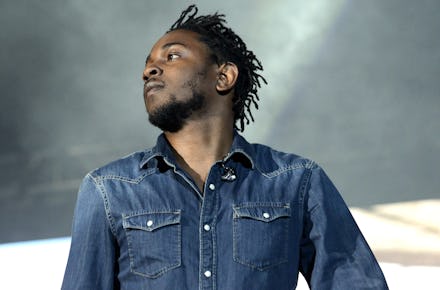Kendrick Lamar Just Nailed the Huge Problem With How We Talk About Race

Kendrick Lamar's To Pimp A Butterfly came out at a crucial time. Right in the midst #BlackLivesMatter movement, in the relative lull between the non-indictment in the Eric Garner case and Baltimore, Lamar dropped one of the most powerful affirmations and provocative discussions of black identity in recent memory — his record, To Pimp a Butterfly.
In recent interviews, Lamar has expanded on the album's themes. In his new Ebony profile, Lamar hit on one of the biggest issues with the way that we talk about race, namely, colorism: our obsession with people's skin tones:
Lamar's response stemmed from a question about a recent Rolling Stone cover photo. That cover shows a lighter-skinned girl twisting Lamar's braids, which, according to Ebony, drew criticism in some circles with people accusing her of being "too light-skinned or wondering if she was white."
Lamar insists the girl was black, but points out that this obsession over skin tone is absurd. Unfortunately, colorism is all too present in our world. It can be traced to American slavery, as lighter-skinned slaves were often invited to work in the house, while darker-skinned slaves worked the fields. Though it's only a question of pigmentation, as recently as the 2000s, studies show that light-skinned black people are more likely to secure better regarded employment than dark-skinned black people.
Lamar's insistence that one's color has little to do with one's race matches well with many of the messages throughout To Pimp a Butterfly. "Complexion (A Zulu Love)" unpacks the issue start to finish. "Dark as the midnight hour or bright as the mornin' sun / Give a fuck about your complexion, I know what the Germans done," Lamar raps. And later: "Color should never rival / Beauty is what you make it."
But Lamar feels that things are changing. "The times that we are in, it's something that you can only feel in the air," Lamar told Ebony. "You don't need the news or the Internet to watch it. You can walk outside and just feel it. And these are the same times that I believe Marvin Gaye and them felt, just in a whole other generational perspective."
And Lamar is dedicated to using his influence to hasten the coming change. "And if I can use my platform to carry on a legacy and talk about something that's real, I have to do that, period," he said.
It starts with making incredible, thought-provoking music. And it's carried through by Lamar being an outspoken and fearless thought leader with every mic that's offered him.
h/t Ebony